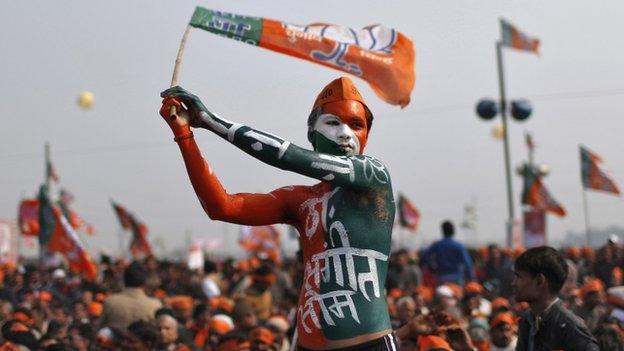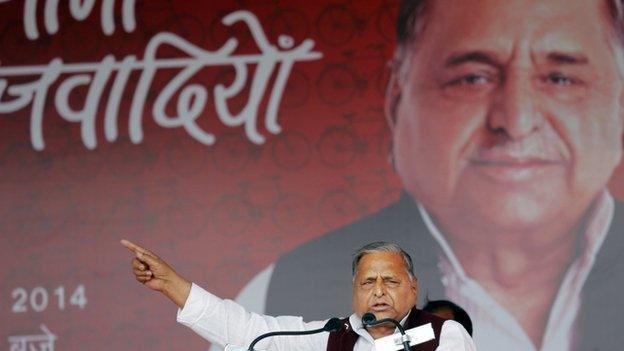India's largest state becomes election battleground
- Published

Narendra Modi urged his supporters to vote for the BJP
Media in India are reporting that the northern state of Uttar Pradesh (UP) has become the key battleground for the upcoming general elections.
With 80 constituencies, the state sends the maximum number of MPs to the Lok Sabha (lower house of the parliament).
The Lok Sabha has 543 elected seats and any party or a coalition needs a minimum of 272 MPs to form a government.
Many in India say "the road to Delhi goes via UP", suggesting that it is important for political parties to perform well there to win the elections.
Political parties, hence, are stepping up their campaign in the state ahead of the polls, due by May.
Narendra Modi, the main opposition Bharatiya Janata Party's (BJP) candidate for PM, held a rally in Lucknow, while the regional Samajwadi Party chief Mulayam Singh Yadav addressed his supporters in Allahabad on Sunday.
"Getting a majority of seats in Uttar Pradesh is essential for Mr Modi and Mr Yadav to fulfil their ambitions for the prime leadership position at the national level," says the The Hindu website., external
The BJP leader criticised Mr Yadav's party, which is ruling the state, for failing to stop religious riots and poor law and order situation in the state, reports say.
Hindu-Muslim riots resulted in over 40 deaths in the state's Muzaffarnagar town last year.
In return, Mr Yadav made a fiery attack on the BJP, external and blamed Mr Modi for the 2002 anti-Muslim riots in the western state of Gujarat.

Mulayam Singh Yadav says the BJP "cannot give good governance"
Mr Modi is often blamed for not doing enough as the chief minister of Gujarat to stop the riots. He has always denied any wrongdoing.
The Aam Aadmi Party (AAP), or Common Man's Party, leader Arvind Kejriwal also took a dig at Mr Modi during a rally in Kanpur, another city in Uttar Pradesh.
"There is no Modi wave. It's only on news channels. But, yes there is a wave of a different kind. It's a wave of people's anger," the paper quotes Mr Kejriwal as saying.
The AAP made a surprisingly strong debut in the state elections in Delhi last December by promising to fight corruption, and now has ambitions to repeat its success against major political parties in the general election.
Staying with politics, parties are turning to mobile phone application WhatsApp to directly connect with the voters, The Times of India, external reports.
"Top politicians from nearly all parties... have realised the potential of the application which can be used both for private and group messaging," the paper says.
The two main parties - the Congress and the BJP - have launched their WhatsApp numbers, the paper adds.
Meanwhile, newspapers feel India should avoid being "drawn into" the rift between Iran and Saudi Arabia after the visits last week to Delhi by the Saudi Arabian crown prince Salman bin Abdul Aziz al-Saud and Iranian Foreign Minister Javad Zarif.
The Hindu, external feels that "India has to stay clear of the crossfire between Saudi Arabia and Iran, which are at loggerheads on account of the situation in Syria".
"Delhi has a delicate balancing act at hand. Both countries are critical for India's energy security," The Indian Express, external says.
Iran, a Shia nation, and Saudi Arabia, a Sunni country, are often at loggerheads over greater influence in the Middle East.
Misleading adverts
And finally, misleading advertisements, such as ones promising hair growth for bald men, are likely to be curbed, The Times of India, external reports.
"To monitor such advertisements and to protect consumers' interest, the consumer affairs department has formed an inter-ministerial monitoring committee that can even give direction to drop such advertisements," the paper says.
BBC Monitoring, external reports and analyses news from TV, radio, web and print media around the world. For more reports from BBC Monitoring, click here. You can follow BBC Monitoring on Twitter , externaland Facebook, external.